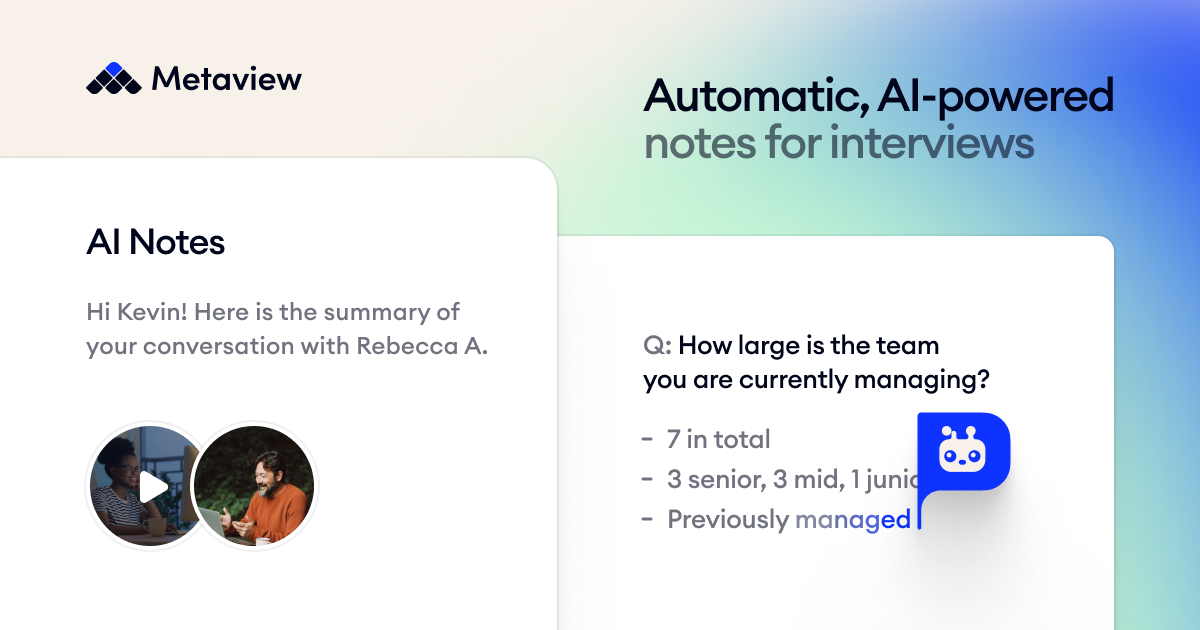Siadhal Magos and Shahriar Tajbakhsh were working at Uber and Palantir, respectively, when they both came to the realization that hiring — particularly the process of interviewing — was becoming unwieldy for many corporate HR departments.
“It was clear to us that the most important part of the hiring process is the interviews, but also the most opaque and unreliable part,” Magos told TechCrunch. “On top of this, there’s a bunch of toil associated with taking notes and writing up feedback that many interviewers and hiring managers do everything they can to avoid.”
Magos and Tajbakhsh thought that the hiring process was ripe for disruption, but they wanted to avoid abstracting away too much of the human element. So they launched Metaview, an AI-powered note-taking app for recruiters and hiring managers that records, analyzes and summarizes job interviews.
“Metaview is an AI note-taker built specifically for the hiring process,” Magos said. “It helps recruiters and hiring managers focus more on getting to know candidates and less on extracting data from the conversations. As a consequence, recruiters and hiring managers save a ton of time writing up notes and are more present during interviews because they’re not having to multitask.”
Metaview integrates with apps, phone systems, videoconferencing platforms and tools like Calendly and GoodTime to automatically capture the content of interviews. Magos says the platform “accounts for the nuances of recruiting conversations” and “enriches itself with data from other sources,” such as applicant tracking systems, to highlight the most relevant moments.
“Zoom, Microsoft Teams and Google Meet all have transcription built in, which is a possible alternative to Metaview,” Magos said. “But the information that Metaview’s AI pulls out from interviews is far more relevant to the recruiting use case than generic alternatives, and we also assist users with the next steps in their recruiting workflows in and around these conversations.”

Image Credits: Metaview
Certainly, there’s plenty wrong with traditional job interviewing, and a note-taking and conversation-analyzing app like Metaview could help, at least in theory. As a piece in Psychology Today notes, the human brain is rife with biases that hinder our judgement and decision making, for example a tendency to rely too heavily on the first piece of information offered and to interpret information in a way that confirms our preexisting beliefs.
The question is, does Metaview work — and, more importantly, work equally well for all users?
Even the best AI-powered speech dictation systems suffer from their own biases. A Stanford study showed that error rates for Black speakers on speech-to-text services from Amazon, Apple, Google, IBM and Microsoft are nearly double those for white speakers. Another, more recent study published in the journal Computer Speech and Language found statistically significant differences in the way two leading speech recognition models treated speakers of different genders, ages and accents.
There’s also hallucination to consider. AI makes mistakes summarizing, including in meeting summaries. In a recent story, The Wall Street Journal cited an instance where, for one early adopter using Microsoft’s AI Copilot tool for summarizing meetings, Copilot invented attendees and implied calls were about subjects that were never discussed.
When asked what steps Metaview has taken, if any, to mitigate bias and other algorithmic issues, Magos claimed that Metaview’s training data is diverse enough to yield models that “surpass human performance” on recruitment workflows and perform well on popular benchmarks for bias.
I’m skeptical and a bit wary, too, of Metaview’s approach to how it handles speech data. Magos says that Metaview stores conversation data for two years by default unless users request that the data be deleted. That seems like an exceptionally long time, and candidates would probably.
But none of this appears to have affected Metaview’s ability to get funding or customers.
Metaview this month raised $7 million from investors including Plural, Coelius Capital and Vertex Ventures, bringing the London-based startup’s total raised to $14 million. Metaview’s client count stands at 500 companies, Magos says, including Brex, Quora, Pleo and Improbable — and it’s grown 2,000% year-over-year.
“The money will be used to grow the product and engineering team primarily, and give more fuel to our sales and marketing efforts,” Magos said. “We will triple the product and engineering team, further fine-tune our conversation synthesis engine so our AI is automatically extracting exactly the right information our customers need and develop systems to proactively detect issues like inconsistencies in the interview process and candidates that appear to be losing interest.”
Source link


